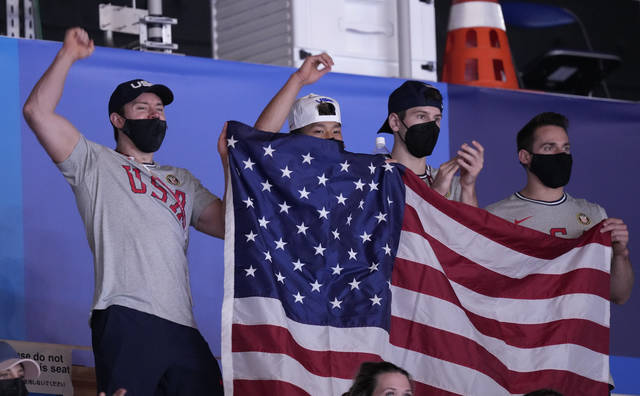https://mirror.triblive.com/sports/olympics-roundup-athletes-trying-to-overcome-silence-in-tokyo/
Olympics roundup: Athletes trying to overcome silence in Tokyo

TOKYO — American gymnast Sam Mikulak flipped off the parallel bars, stuck the landing and blew a kiss toward the camera. Those watching the men’s Olympics gymnastic competition on television back home knew they’d seen magic.
“Beautiful!” the broadcast announcer exclaimed. “Wow, that was fantastic!”
But all around Mikulak, the stretches of wooden benches meant to seat thousands sat mostly empty. Cheers erupted from a far back corner of the stands, where Simone Biles and the rest of the women’s team screamed as loud as lungs could muster to cut through the eerie quiet of the pandemic Olympic venue.
In arenas across Tokyo, athletes accustomed to feeding off the deafening roar of the crowd are searching for new ways to feel Olympic enthusiasm.
They’re rooting for each other as loudly as they can. Some are trying to envision fans at home in their living rooms, leaning into TV screens. They’re blasting playlists in backstage training rooms. The lucky few permitted to compete with headphones keep their phones in their pockets, tuned to songs with a beat to replace the thrill of applause.
But others were surprised to find the silence motivating — like another day at the gym rather than the most prestigious competition on Earth. For them, the emptiness numbs the nerves and lets them fully focus on their sport.
“It’s kind of nice,” said Mikulak, a three-time Olympian whose parallel bar routine helped usher him to finals. It barely feels like an Olympics to him, he said, but when he stuck that landing and heard his own team cheering, that felt like enough.
“We created our own bubble. We had our own cheering section,” he said. “We created our own atmosphere. That’s what we thrive in, having each other’s backs.”
The next day, they returned the favor. The US men’s gymnastics team stood in the back waving an American flag and screaming for their female counterparts before the stadium fell quiet again, like the others scattered across Tokyo.
At the Sea Forest Waterway rowing venue, grandstands that stretch for nearly 2,000 meters (yards) are empty all the way to the finish line. The events are so quiet, rowers can hear the ripple of their own wake and the flap of hundreds of national flags whipping in the breeze on the shoreline. What is typically a swelling crescendo of chants and rush of adrenaline over the final 250 meters to the finish line replaced by the labored breathing wracking their lungs.
“When you cross the line and you’re hurting, and you feel like you are going to pass out and you don’t hear the ‘USA! USA!’, chant it hurts a little bit more,” said ÚS women’s rower Ellen Tomek, competing in her third Olympics and reminding herself that people are rooting from her from home. “Everyone is cheering us on, but when you are hurting and sad and you can’t look up for you mom in the stands, it sucks.”
Rains hit Games
The rains came to Tokyo on Tuesday morning.
After many days of blistering sunshine and summer humidity, enough to cause discomfort and heatstroke at some venues in recent days, the rain cooled Tokyo by about 10 degrees, taking the edge off.
But worries about the effect of Tropical Storm Nepartak and its accompanying drenching have led to changes in Olympic events and some cancellations of practices as preparations for the storm proceed.
The storm is expected to make landfall in Japan on Tuesday evening.
First for Bermuda
Flora Duffy has won the Olympic women’s triathlon, earning Bermuda’s first Olympic gold medal and its first medal of any kind since 1976.
Duffy is a two-time former world triathlon series champion. She’s competing in her fourth Olympics and is one of just two athletes representing Bermuda in Tokyo.
The start of the race was delayed 15 minutes because of storm conditions around Tokyo Bay. Duffy pumped her arms over her head as she finished the swimming, cycling and running course in 1 hour, 55 minutes, 36 seconds.
The 33-year-old Duffy never had finished higher than eighth in her previous three Olympic triathlons. Bermuda hadn’t medaled at the Olympics since boxer Clarence Hill’s bronze in heavyweight boxing in Montreal.
Great Britain’s Georgia Taylor-Brown won the silver medal and American Katie Zaferes won bronze.
Copyright ©2026— Trib Total Media, LLC (TribLIVE.com)
